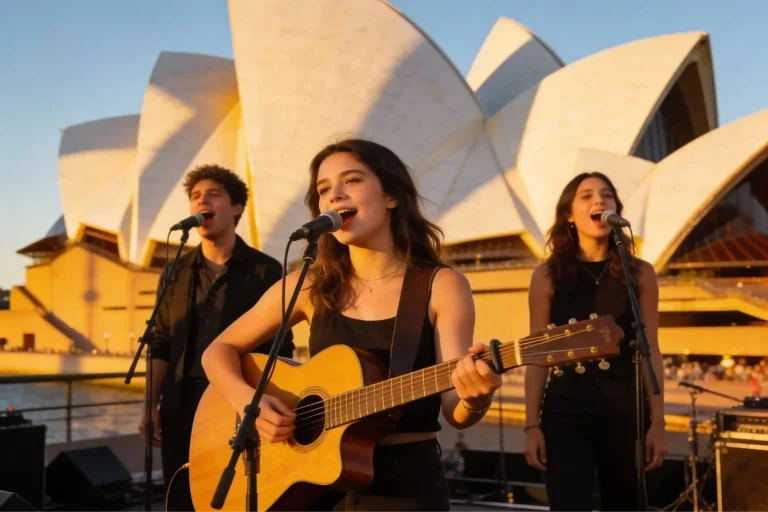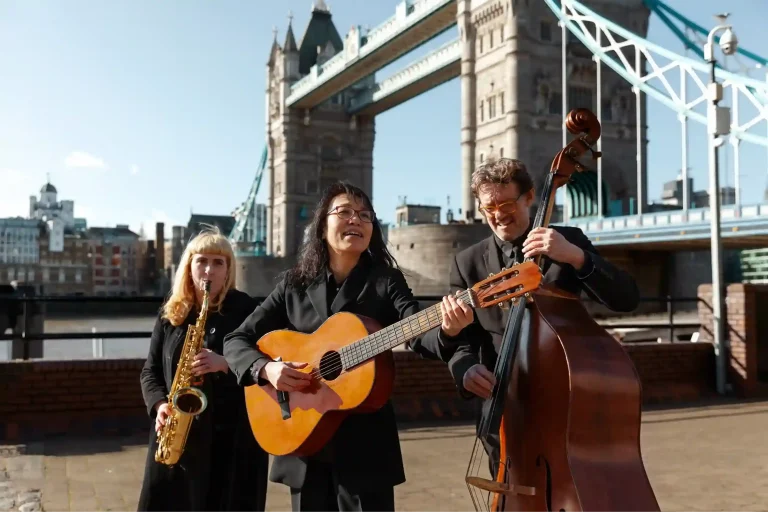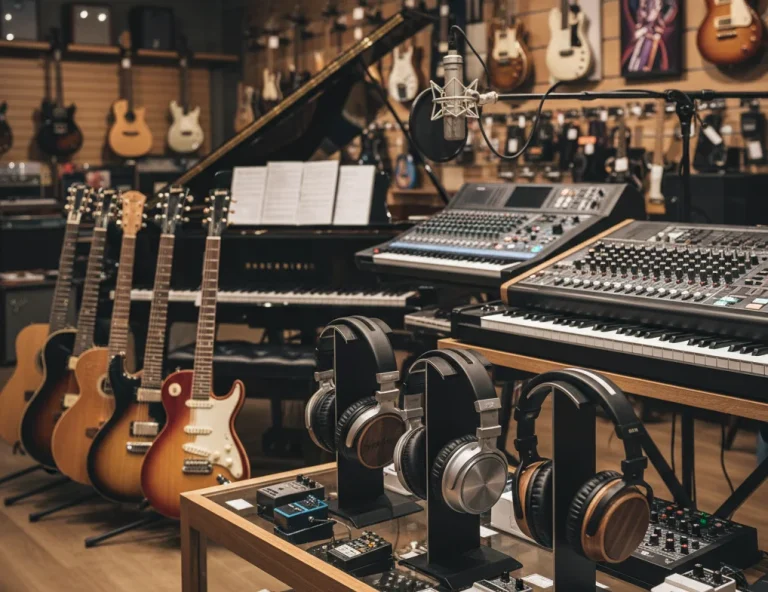All Topics
- Alchemizing Music Concepts for Students
- Artist Spotlight
- artium gift card
- Artium Maestros
- Artium News
- buying guide
- Carnatic Music
- Devotional Music
- Editorials by Ananth Vaidyanathan
- Film Music
- Guitar
- Hindustani Classical Music
- Indian Classical Music
- Indian Folk Music
- Insights
- Instruments
- Karaoke Singing
- Keyboard
- Kids Music
- maestros
- Music Education
- Music for Kids
- Music Industry
- Music Instruments
- Music Legends
- Music Theory
- Music Therapy
- Piano
- piano guide
- Success Stories
- Tamil Film Music
- Telugu Film Music
- Time Theory
- Tools
- Uncategorized
- Vocal Singing
- Vocals
- western classical music
- western music
- Western vocal music
What are the Benefits of Music Education, Especially for Children
What are the Benefits of Music Education, Especially for Children
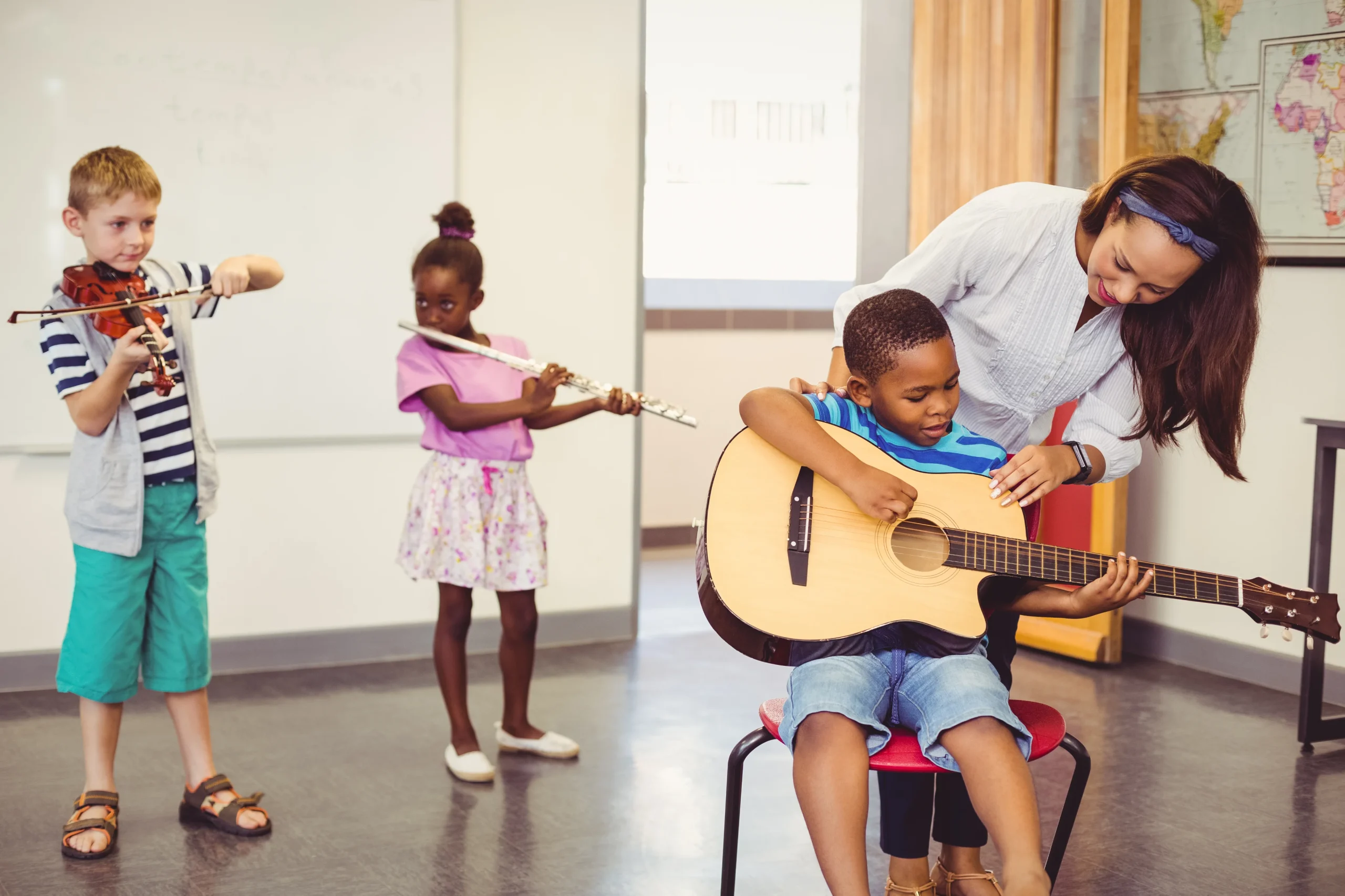
Table of Contents
The essence of being human—our innate ability to understand images and patterns—allows us to grasp musical notation and recognize melodic and rhythmic structures. Just as we decipher a melody’s structure or a beat’s rhythm, children also learn to identify and predict musical patterns. This active engagement with musical notation, melodies, and rhythms during music education isn’t just about learning songs; it’s a powerful workout for the brain.
Analyzing musical structures helps children understand harmonic relationships, like grasping cause and effect in life. Visualizing musical ideas or imagining the flow of a melody strengthens their spatial-temporal skills – crucial for subjects like math and science.
This deep interaction with music ignites their imagination, allowing them to create their melodies and rhythms and boosting their overall creativity. Moreover, music education for kids, the act of performing music, whether singing or playing an instrument, builds confidence and enhances their ability to express themselves, fostering a holistic development that extends far beyond the musical realm.
“Designing the ignition and development of all these skills should be the conscious goal of education, especially at school level.”
Why Does Your Child Need Music Classes Along with Basic Education?
Education, ideally, is the process of making a child experience the development of human realization. That is why we teach physics, chemistry, biology, geography, and mathematics, and then economics, finance, and history.
Restricting a child’s education to only the sciences is a gross disservice to the child’s holistic development. It is only when education moves into the arts that the inheritance of the historical human experience of the Universe comes full circle and becomes complete.
To understand the benefits of music education for children in a logical, organized manner, one can follow the sequence of human experience through physical skills, honing and maximizing physical skills and simultaneously developing knowledge.
The benefits of music learning, therefore, can be seen at all these levels. With proper music education, your child grows:
- Logical sense
- Cognition
- Pattern recognition
- Image comprehension
- Memory processing
- Deeper understanding
- Creation and imagination
- Reflecting
Also Read: Why Artium Academy is the Best Platform for Kids’ Music Classes?
Development of a Range of Senses and Skills through Music
- Heightening Sensory Perception
Music training heightens sensory perception towards exactitude and precision, both in the realms of pitch and rhythm. This principle can extend to other arts with a visual dimension, which is why it is often recommended that musicians learn other arts, too—painting and dancing. This is also comes under benefits of music education for kids.
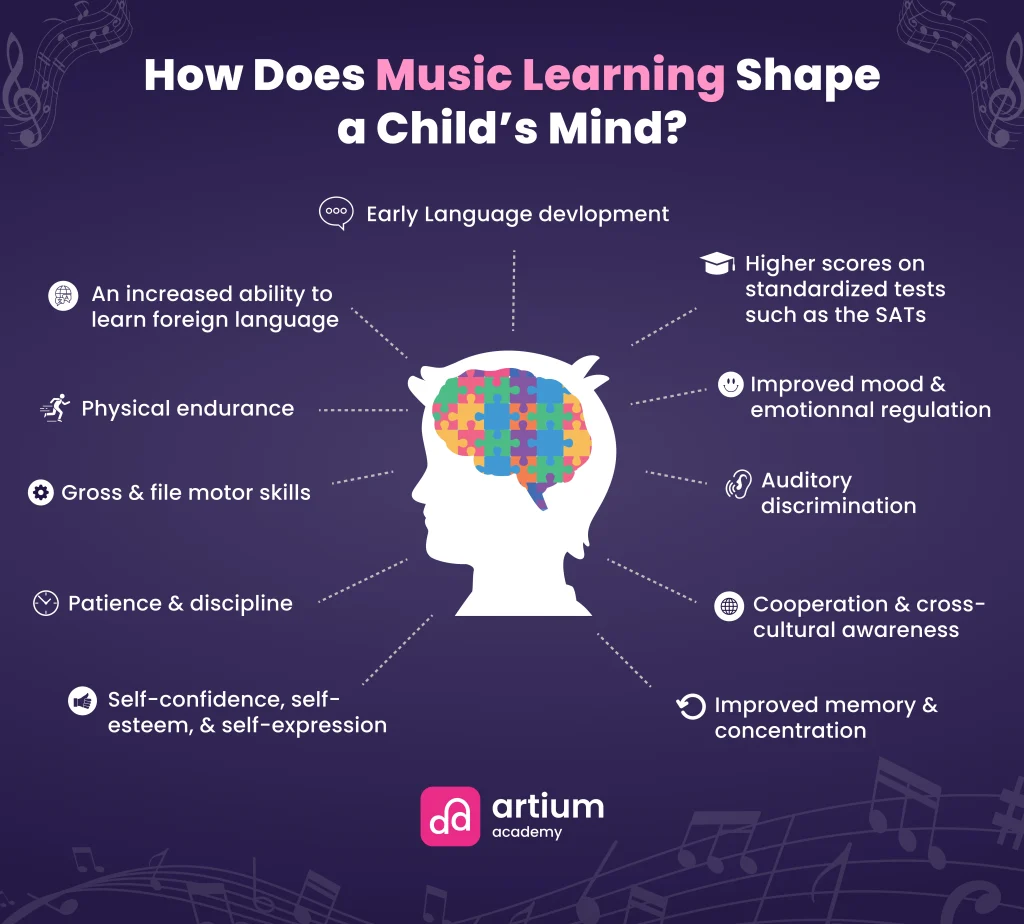
- Developing Cognitive Ability
Cognition becomes complex in the realm of music, and herein lies an opportunity to aid cognitive development. A simple song sounds attractive to most. But a complex melody, a raga alaap, can go over the heads of many—that can be defined as a temporary cognitive challenge.
Developing musical cognitive ability comes from exposure, training in recognizing patterns and images, and training in generating those images. The line of a melody is an image. Cognition is a must to move further. In art, with cognition comes enjoyment, appreciation, and emotional aesthetic response.
As a student is trained progressively in recognizing patterns, the ability to appreciate and enjoy their beauty and derive joy from them is enhanced, enhancing cognitive power. Melody, like raga alaaps and symphonies, can be complex.
So, the best music for training can be simple, catchy songs. The same goes for rhythm, metres, and grooves. Pitch and rhythm are manifested through sound—voice, instruments, and varieties of drums.
Melody, rhythm, sound textures, volume, dynamics and the play of drama in music education all come together to give us a heady musical experience. The more we know how it all works together, the better we are able to cognate and derive joy from. Thus music is the most potent tool for developing cognitive power holistically.
The much-spoken-about left–brain—right-brain coordinated development is usually discussed in the context of analytical and creative skills. The actual extension and integration that is achieved through art education are from sensing to cognition to aesthetics.
“Art cannot be cognized or reflected on unless it touches the aesthetic level of being (touches the soul, as some express it). We owe our children this gift—to develop cognition through aesthetics.”
- Empowering Memory
Memory is the repository that enables intellect to operate at the level it does in Man. Deep memory is accessed through emotion, of which aesthetic response is an ancillary. How does a Carnatic musician remember thousands of keertanams and render them without a score? It is the power of aesthetics and emotional response that empowers memory. Music training which a child thoroughly enjoys can be a phenomenal memory enhancer.
- Developing Conceptual Skills
Once the cognitive and aesthetic levels are reached, they lead to the next level—understanding concepts—the logic of pitch intervals, octaves, scales, modes, ragas, raga grammar, tempo, multiples, metre, time signatures, tala, and syncopation. Conceptualization is the basis of deconstruction, grammar, and knowledge.
- Developing Mathematical Senses
Math is best taught experientially. Indian classical music, especially, has taken arithmetic in rhythm to incredibly complex levels. What is significant is not the complexity itself but the manner in which the inner metronome and calculator are empowered.
What does that mean? Have you ever noticed that when you are climbing a flight of stairs, a few steps before you reach the top landing, you will know which foot is going to land on top – left or right? How does it happen? This is the ‘gut’ working which in actual fact is not a conjecture system, but a calculator at sub conscious level.
Just as the inner clock wakes us up at the intended time without an alarm! This inner arithmetician gets empowered in tala training. Seasoned artists often belt out complex improvisations in rhythm without awareness of the calculations involved!
- Language and Essay Skills
Musical form exhibits a sense of essaying, which is very obvious in language. Creating an appealing musical script is the hallmark of a good composer or improviser. This sense is as innate to all humans as the sense of pitch and rhythm.
It is absolutely essential to develop this sense and further to train students in the concepts of essaying – some of which are common to all music systems, and some of which are unique to each system. Even those who simply learn and render songs develop a sense of essaying over time – simply by exposure.
- Creative Skills
These skills combine essaying sense/skills, concepts and techniques of musical scripting and aesthetics. That is why composers in all systems worldwide are venerated – from Beethoven to Thyagaraja, from Madan Mohan to A.R. Rahman.
The skills will enhance the power of creativity and aesthetics in all walks of life.
- Developing Motor skills and Muscular/Organic/Systemic Coordination
Artistry often begins with the body—be it in painting, dance, or music. In instrumental music, the biggest challenge is multi-organ coordination, especially between the left and right hands.
Watching a pianist play melody with one hand and harmony with the other looks effortless—until you realize each hand follows a different artistic script. It’s a true testament to human brilliance.
Every child needs to learn a double-handed instrument, where the hands do not mirror each other but perform individual actions that coordinate to produce an integral action and experience.
“We say – I picked up the glass. We don’t say – my hand picked up the glass. The pursuit of precision and excellence in art, sport or any activity in the physical dimension will need to take a learner deep into objective body awareness. This is where subjects like voice training (Vocal Pedagogy), sports techniques, etc., come into being.”
These disciplines help students gain deeper body awareness, fostering overall physical, mental, emotional, and spiritual well-being. As the only beings capable of visualizing and achieving goals, every child deserves to discover and experience their true potential.
Also Read: 10 Benefits of Enrolling Your Child in Music Classes
Personality Development and Healing
- Discipline, self-control
Pursuing art implies drawing upon the entire range of faculties, from precise sensory perception to cognition, memory, aesthetics, creativity, and body-level skill development. A skill qualifies to be called a skill only when it crosses a quality threshold.
This requires the dedicated, relentless, almost mindless practice that artists and sportsmen are celebrated for. This kind of aware, dedicated practice calls for tremendous emotional resilience—fighting against boredom and mental fatigue, if not physical fatigue. Once the student starts reaping the benefits of practice, he begins to appreciate the value of discipline, self-control, emotional balancing, and management.
- Self-esteem, sense of achievement
Several studies prove that music education enhances self-esteem. Self-esteem is not a product of succeeding in the social space. It is primarily a product of an enhanced relationship with oneself – an enhanced self-view. The process of understanding the game of music, engaging in it, setting goals and achieving them enhances self-view tremendously.
- Ability to handle public exposure – overcoming stage fear
Music is a performing art. Public performance is the goal, the aspiration and the challenge, too. The intent is thwarted by low self-view (as a musician), fear of exposure, ridicule, and failure. But once the fears are overcome, the high that one experiences is incalculable.
- Diagnosis, goal setting, and progress monitoring skills
Music training is an individual process. A student works on understanding the tenets of quality, understanding himself in that context, setting objectives and targets, following a process, asking for and getting guidance, and monitoring his/her progress.
This constitutes excellent training in diagnosis, goal setting, and progress monitoring—skills that travel with the student through life and add value to any of his engagements.
- Teamwork, social skills
Music is also teamwork. A minimum band or orchestra is a must. Coordination, cooperation, and teamwork are essential to the fabric of the music—even Indian music, where the so-called solo classical performer has to engage deeply, intelligently, and creatively with the percussion and melodic accompaniment.
Ensuring that students move into musical group training—including choral singing—is powerful for developing social skills, respect for teamwork, a sense of responsibility in handing over the baton in a sequential task, etc.
- Gratification vs. joy
From age 10 to late teens, a child’s need for gratification increases manifold and can express itself in any form, such as addiction to TV or the internet. Frustrated gratification can channel anger, aggression, meanness, boredom, and later, worse.
- From childhood to adulthood
Music education is valuable at any age. Even adults who missed early training can benefit deeply from learning a genre they love. With greater conceptual understanding, adults can connect more meaningfully with music, using it to heal, grow, and for self-development. The transformative power of art and music in enhancing well-being should never be underestimated.
The Best Platform For Online Music Training – Artium Academy
If you wish to see your child as an aspiring singer or musician, we highly recommend enrolling your child at Artium Academy. To help you reach their musical potential, nurture your kid’s talent, and help them progress on their journey through online music education classes designed and certified by legends like Sonu Nigam, Shubha Mudgal, K.S. Chitra, Louis Banks, Gino Banks, Raju Singh, Aruna Sairam, and Ananth Vaidyanathan.
Here’s why over 30,000 learners trust us with their musical aspirations –
- 1:1 learning: Personal attention in every class
- Tailored Curriculum – Designed to match your pace and goals
- Perform with Confidence – Regular recitals and feedback loops
- Trusted Faculty – Learn from experienced teachers and artists
So, whether you’re a parent looking for vocal music classes for your child or an adult who is a music lover looking to pursue your passion, finally, we’re here to guide you.


